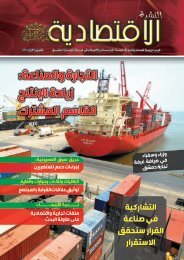SIGAR
2017-01-30qr
2017-01-30qr
You also want an ePaper? Increase the reach of your titles
YUMPU automatically turns print PDFs into web optimized ePapers that Google loves.
QUARTERLY HIGHLIGHT<br />
Suspensions and Debarments: An Important<br />
Tool to Safeguard America’s Investment in<br />
Afghanistan<br />
Since its inception, <strong>SIGAR</strong> has recognized that fraud<br />
committed by contractors and other recipients of government<br />
funding has been a major threat to the success<br />
of reconstruction efforts in Afghanistan. The inability<br />
to address fraudulent conduct by individuals and organizations,<br />
whether through shoddy performance, false<br />
claims, diversion of resources, or, in many cases outright<br />
theft, puts military personnel, contractors, and their<br />
employees at risk.<br />
The best-known remedies for fraud or other misconduct<br />
are criminal prosecution or civil litigation. These<br />
remedies are often unavailable in Afghanistan, so <strong>SIGAR</strong><br />
also uses a lesser-known, but effective, option—suspensions<br />
and debarments.<br />
Suspensions and debarments are actions taken by<br />
U.S. agencies to exclude companies or individuals from<br />
receiving federal contracts or assistance because of<br />
misconduct. They are important tools for ensuring that<br />
agencies award contracts only to responsible entities.<br />
<strong>SIGAR</strong>’s program addresses three challenges facing U.S.<br />
policy and contingency contracting in Afghanistan:<br />
• the need to act quickly<br />
• limited U.S. jurisdiction over Afghan nationals and<br />
Afghan companies<br />
• difficulty in vetting multiple tiers of subcontractors<br />
<strong>SIGAR</strong> makes referrals for suspensions and debarments<br />
based on its completed investigations. In most<br />
cases, a referral is the only remedy for contractor misconduct<br />
after a contracting office fails to prosecute or<br />
take remedial action in response to an allegation. In<br />
making referrals to agencies, <strong>SIGAR</strong> provides the basis<br />
for a suspension or debarment decision, as well as supporting<br />
documentation in case the contractor challenges<br />
the decision. <strong>SIGAR</strong> has found it necessary to refer<br />
some individuals or companies on multiple occasions<br />
for misconduct or poor performance.<br />
How it Works<br />
<strong>SIGAR</strong>’s mission is to conduct audits and investigations<br />
of all U.S. government agencies engaged in Afghanistan<br />
reconstruction. Operating in a foreign legal jurisdiction<br />
makes that challenging. Other complications include the<br />
presence of third-country civilians, foreign corporations,<br />
NATO military and civilian personnel, nongovernmental<br />
organizations, and an active and ongoing insurgency.<br />
Criminal prosecutions and civil cases often encounter<br />
significant difficulties in developing sufficient evidence<br />
or establishing the jurisdiction required to bring a criminal<br />
or civil case in a U.S. District Court.<br />
<strong>SIGAR</strong> initiated its suspension and debarment program<br />
because many instances of fraud were not being<br />
addressed due to lack of a means to impose criminal<br />
or civil remedies, or lack of a mechanism to ensure<br />
referral to agency suspension and debarment officials.<br />
<strong>SIGAR</strong> found, however, that recipients of government<br />
funding in Afghanistan considered the financial consequences<br />
and social stigma of being excluded from<br />
contracts, grants, and other programs to as great or<br />
greater punishment as criminal sanctions. In response,<br />
<strong>SIGAR</strong> developed a program to ensure that referrals<br />
for suspensions and debarments took place in a<br />
timely manner and not as afterthoughts to criminal and<br />
civil remedies.<br />
In contingency contracting, there are often barriers<br />
between the agent or auditor gathering information on<br />
a contractor and the agency attorney assembling the<br />
case for review by the suspension and debarment official.<br />
Agencies’ agents or auditors typically have minimal<br />
contact with the attorney conducting the suspension<br />
or debarment, and the attorney has no oversight over<br />
the conduct of the investigation. This is especially<br />
true in contingency-contracting environments that are<br />
geographically remote, and where there is no preexisting<br />
relationship between the agent or auditor and the<br />
attorney. The result can be misunderstanding about<br />
how, when, and why suspension and debarment may<br />
be applied.<br />
REPORT TO THE UNITED STATES CONGRESS I JANUARY 30, 2017 55







